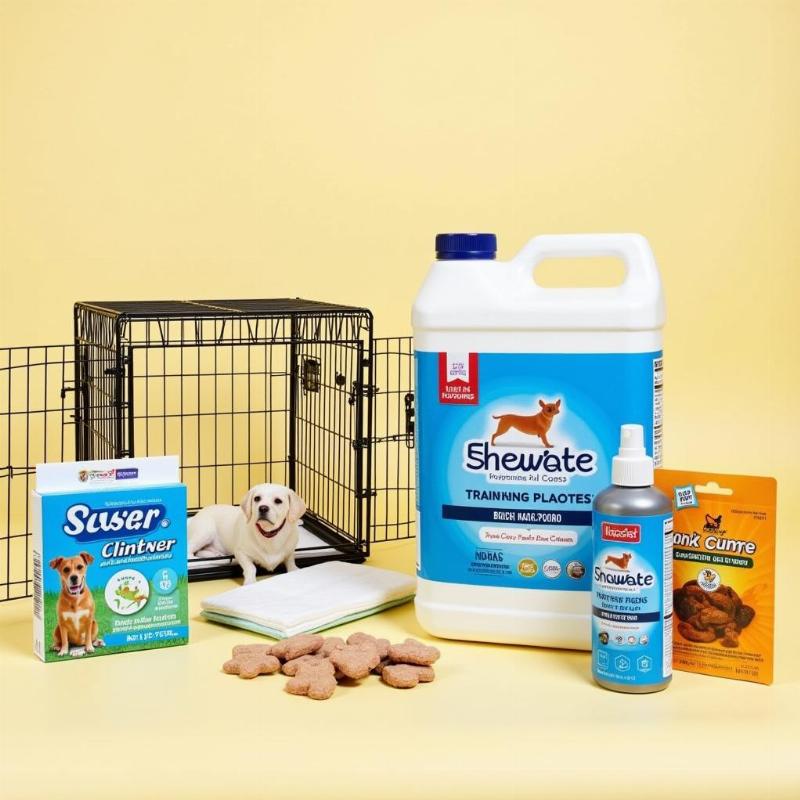House training a puppy can be challenging, and it’s not uncommon for a 6-month-old dog to still have accidents. If your dog is 6 months old and not potty trained, don’t despair! While most puppies grasp the basics earlier, every dog learns at their own pace. There are several reasons why your furry friend might still be struggling, and thankfully, numerous proven methods can help them finally become reliably house-trained. This article will guide you through the common reasons for potty training difficulties in 6-month-old pups, offer practical solutions, and provide the support you need to navigate this phase.
Understanding Why Your 6-Month-Old Isn’t Potty Trained
Several factors could contribute to your 6-month-old dog’s potty training struggles. Medical issues, such as urinary tract infections, can cause increased urgency and accidents. Inconsistency in training methods, infrequent potty breaks, or a lack of positive reinforcement can also hinder progress. Additionally, some breeds are naturally more challenging to house train than others. Identifying the underlying cause is crucial for implementing effective solutions.
Medical Reasons for Accidents
Before tackling behavioral training, rule out any medical issues. If your dog suddenly starts having accidents after being previously house-trained, a vet visit is essential. Conditions like bladder infections, diabetes, or even intestinal parasites can disrupt their ability to control their bladder or bowels.
Behavioral Reasons for Accidents
If your vet gives your pup a clean bill of health, the reasons are likely behavioral. Common culprits include inconsistent training schedules, inadequate supervision, insufficient positive reinforcement, or even anxiety and stress.
Effective Potty Training Techniques for a 6-Month-Old Dog
Don’t worry, it’s not too late! Even if your 6-month-old pup isn’t house-trained yet, consistent training and positive reinforcement can work wonders.
Establish a Consistent Routine
Create a predictable schedule for potty breaks. Take your dog out first thing in the morning, after meals, after naps, after playtime, and before bedtime. Consistency is key!
Positive Reinforcement is Your Best Friend
Reward your dog immediately after they eliminate outdoors with enthusiastic praise and a small, tasty treat. This positive association will encourage them to repeat the desired behavior.
Supervise and Manage Their Environment
Keep a close eye on your puppy, especially after waking up or eating. Watch for signs like circling, sniffing, or squatting, which indicate they need to go. If you catch them in the act, interrupt with a firm “No!” and immediately take them outside.
Clean Up Accidents Thoroughly
Use an enzymatic cleaner specifically designed for pet messes to eliminate odors and discourage repeat offenses in the same spot.
 Various potty training aids for dogs, including potty pads, enzymatic cleaner, and a crate.
Various potty training aids for dogs, including potty pads, enzymatic cleaner, and a crate.
Addressing Specific Challenges
My dog only pees inside when I’m not looking.
This is a common issue. Increase supervision and confine your dog to a smaller area, like a crate or a puppy-proofed room, when you can’t watch them closely.
My dog has accidents in the crate.
Make sure the crate isn’t too large. It should be just big enough for your dog to stand, turn around, and lie down comfortably. Too much space can encourage them to eliminate in one corner and sleep in another.
Conclusion
Potty training a 6-month-old dog requires patience, consistency, and positive reinforcement. While it can be frustrating, remember that every dog learns at their own pace. By addressing the underlying cause of the accidents, implementing effective training techniques, and maintaining a positive approach, you can help your furry friend become reliably house-trained and enjoy a happy, accident-free life together.
FAQ
- Is it normal for a 6-month-old dog to not be potty trained? While most puppies are house-trained earlier, some take longer. Don’t worry, it’s not too late!
- How long does it take to potty train a 6-month-old dog? With consistent effort, you should see significant improvement within a few weeks.
- Should I punish my dog for accidents? Never punish your dog for accidents. This can create fear and anxiety, making the problem worse.
- What if my dog keeps having accidents despite my efforts? Consult with a certified dog trainer or your veterinarian for personalized guidance.
- Are there any specific products that can help with potty training? Enzymatic cleaners, potty pads, and crates can be helpful tools.
- How often should I take my 6-month-old dog out to potty? Every 2-3 hours, after waking up, after meals, after play, and before bedtime.
- What are the signs my dog needs to go potty? Circling, sniffing, squatting, and whining.
Beautdogs.us is your premier resource for all things dog-related in the US. We offer expert advice on dog breeds, care, and training, helping you navigate the joys and challenges of dog ownership. Whether you’re a new puppy parent or a seasoned dog lover, Beautdogs.us provides reliable information and resources to support you and your furry friend. Contact us today for personalized advice! Email: [email protected], Phone: +1 501-555-7529.